NIL
Ginnie Graham
Ginnie Graham Teens and preteens shouldn’t be allowed name, image and likeness sports deals because of potential exploitation, harm to small schools, and damage to the spirit of youth and amateur athletics. Then again, NIL deals in Oklahoma high schools are already happening. So instead of trying to reverse course, it’s better just to reform […]


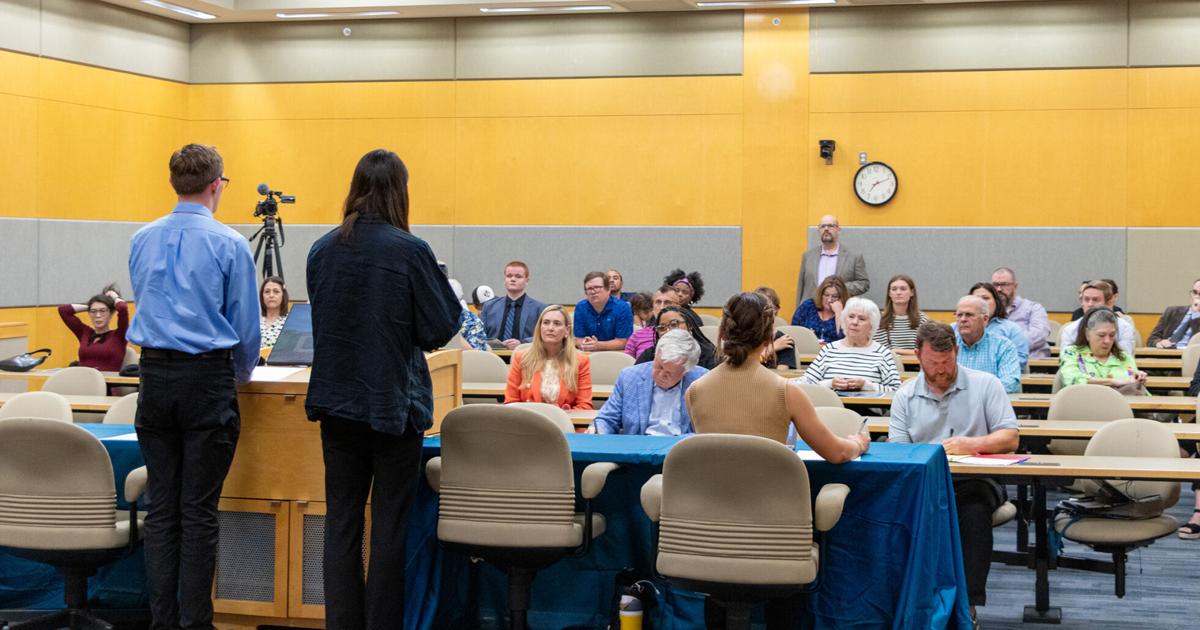
Teens and preteens shouldn’t be allowed name, image and likeness sports deals because of potential exploitation, harm to small schools, and damage to the spirit of youth and amateur athletics.
Then again, NIL deals in Oklahoma high schools are already happening. So instead of trying to reverse course, it’s better just to reform the system.
That’s the summation of the nation’s first Sports Debate City Championship, which was held Wednesday at the University of Tulsa College of Law and featured teams from Tulsa’s Rogers High School and Charles Page High School in Sand Springs.
At the end, I couldn’t choose a winning team. The students were that closely matched. My inclination remains against NIL for teenagers, with mounting frustration that state officials aren’t doing enough to protect kids.
The National Association for Urban Debate Leagues chose the Tulsa Debate League to be the pilot project for expanding into debates devoted to sports topics.
People are also reading…
There’s nothing wrong with the typical high school debate topics. But, honestly, subjects like government exploration of the Arctic, intellectual property rights and the establishment of a comprehensive bilateral trade agreement with the European Union just aren’t as attention-grabbing as NIL.
“Sports is relevant to debate,” said Rhonda Haynes, executive director of NAUDL. “Unfortunately, not a lot of people know about debate. Sports (topics) could create more access and grow an audience, not just for students but adults, as well.”
The Tulsa Debate League remains one of my favorite youth nonprofits. It was founded in 2013 when the only debate team in Tulsa Public Schools was at Booker T. Washington High School. Mostly only private schools could afford debate.
The nonprofit, led by Executive Director Ross Faith, starts and supports programs in public schools. It has a particular knack for finding professionals who are debate alumni and enlisting them as volunteers and donors. The Tulsa Debate League now assists 29 programs in TPS, including at 13 elementary schools, by providing curriculum and volunteers. It hosted 10 debate tournaments during the past school year.
Through these efforts, public school students who never would have learned debate skills now qualify and win state and national awards. They learn how to research and how to argue both sides of an issue. They experience how to disagree respectfully.
“There’s a connection between sports and debate, and that’s competition,” Faith said. “Law is a common pathway for debaters, and there’s a connection between law and sports. Three of the four major league sports commissioners are lawyers. League offices are full of lawyers. So this is among the many pathways there are for debaters.”
The arguments for and against name, image and likeness rights
The debaters came at the NIL topic with research, anecdotes and personal examples. Student Ethan Josefchuk of Rogers High School had been in debate for only a month when he earned a spot in the championship with fellow student Iliel Hurtado Valle.
Josefchuk argued the position in support of NIL benefits at the high school level, calling for “responsible reform.”
“Eliminating NIL is both unrealistic and unfair,” Josefchuk said. “Instead, we advocate for refining the system to make it more equitable and protective of all students.”
The Rogers team likened NIL deals to student actors getting paid for acting gigs or youth cashing in as social media influencers. Their other points: NIL packages incentivize students to participate in sports, and it teaches skills like marketing and financial literacy. They say it would boost school sports over competitive club leagues.
The team acknowledged that inequities exist among schools and various sports, so the goal should be putting in guardrails to close those gaps.
“This is not about whether NIL is perfect. It’s about whether we can improve opportunities,” Hurtado Valle said. “NIL empowers students to earn and grow and stay involved in schools. Let’s not punish ambition. Let’s protect and guide it.”
OK, decent points. I almost changed my mind, but the Sand Spring team came up with good counterpoints on NIL harms to youth.
Recently graduated senior Gracie Gifford, a three-year wrestler and track and field athlete, said NIL deals would only widen inequities, particularly between male and female sports, and erode critical lessons such as teamwork.
“The pursuit of individual NIL deals often overshadows team achievements, which is what high school athletics is all about — growth, amateurism and a competitive environment that prioritizes team success,” Gifford said.
“NIL deals repetitively exclude female athletes. Very few NIL collectives target female athletes because they are looking for what is worth more financially. Unfortunately, we all know that is primarily masculine. There is a clear difference between female wrestlers and male football players in NIL deals.”
Her debate team partner, Braden Fowler, emphasized possible exploitation of youth. Teenagers who lose interest today can quit with little fallout. That could change if big money is on the line. Parents could force their children to keep playing against their will, or NIL donors could exert their influence in toxic ways.
That’s the convincing argument for me. I’ve seen so much bad parental behavior at just the possibility of a kid playing college sports. That’ll be so much worse with NIL.
NIL deals would benefit larger, richer schools with more businesses able to offer lucrative packages, Fowler argued.
“Elite talent is being concentrated in a handful of schools with large fan bases and NIL collectives, leaving smaller fan bases with little hope of recruiting the star players,” he said.
I wasn’t alone in not identifying a clear winner. Veteran debaters and coaches in attendance were reluctant to name the standout team.
“This was an incredibly well-matched debate,” Faith said.
No winner was named because this was a public showcase of the new program. That’s a little ironic, considering this is about sports.
But judges were present to give feedback: Russell Fisher, associate athletic director for compliance at the University of Tulsa; Brentom Todd, deputy chief of staff for the Tulsa Mayor’s Office; and Rick Horrow, chairman of Florida-based Horrow Sports Ventures and the strategic adviser for the sports debate pilot.
“Sports makes debate cool, and debate makes sports more inclusive,” Horrow said. “I’m excited to be part of this program.”
The prevalence of NIL money in Oklahoma high school football
Tulsa World Sports Columnist Bill Haisten previews his story on how much money is being talked about when it comes to the licensing of name, image and likeness of high school football players. After showing up in college football, the contracts are now being signed by high school athletes.
Continue Reading
NIL
Argument over ‘valid buisiness purpose’ for NIL collectives threatens college sports settlement
FILE – LSU quarterback Garrett Nussmeier (13) passes in the first half of an NCAA college football game against Vanderbilt in Baton Rouge, La., Saturday, Nov. 23, 2024. (AP Photo/Gerald Herbert, File) (AP Photo/Gerald Herbert, File) Less than two weeks after terms of a multibillion-dollar college sports settlement went into effect, friction erupted over the […]
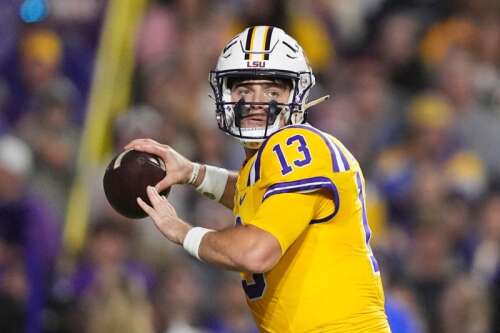
FILE – LSU quarterback Garrett Nussmeier (13) passes in the first half of an NCAA college football game against Vanderbilt in Baton Rouge, La., Saturday, Nov. 23, 2024. (AP Photo/Gerald Herbert, File)
(AP Photo/Gerald Herbert, File)
Less than two weeks after terms of a multibillion-dollar college sports settlement went into effect, friction erupted over the definition of a “valid business purpose” that collectives making name, image likeness payments to players are supposed to have.
The new College Sports Commission sent a letter to athletic directors last week saying it was rejecting deals in which players were receiving money from collectives that were created solely to pay them and don’t provide goods or services to the general public for profit.
A lead attorney for the players responded by saying those instructions went against settlement terms and asking the CSC to rescind the guidance.
“This process is undermined when the CSC goes off the reservation and issues directions to the schools that are not consistent with the Settlement Agreement terms,” attorney Jeffrey Kessler wrote to NCAA outside counsel Rakesh Kilaru in a letter obtained by The Associated Press.
Yahoo Sports first reported details of the letter, in which Kessler threatens to take the issue to a judge assigned with resolving disputes involved in the settlement.
Kessler told AP his firm was not commenting on the contents of the letter, and Kilaru did not immediately respond to AP’s request for a comment.
Yahoo quoted a CSC spokesman as saying the parties are working to resolve differences and that “the guidance issued by the College Sports Commission … is entirely consistent with the House settlement and the rules that have been agreed upon with class counsel.”
When NIL payments became allowed in 2021, boosters formed so-called “collectives” that were closely tied to universities to work out contracts with the players, who still weren’t allowed to be paid directly by the schools.
Terms of the House settlement allow schools to make the payments now, but keep the idea of outside payments from collectives, which have to be approved by the CSC if they are worth $600 or more.
The CSC, in its letter last week, explained that if a collective reaches a deal, for instance, for an athlete to appear on behalf of the collective, which charges an admission fee, that collective does not have a “valid business purpose” because the purpose of the event is to raise money to pay athletes, not to provide goods or services available to the general public for profit.
Another example of a disallowed deal was one an athlete makes to sell merchandise to raise money to pay that player because, the CSC guidance said, the purpose of “selling merchandise is to raise money to pay that student-athlete and potentially other student-athletes at a particular school or schools, which is not a valid business purpose.”
Kessler’s letter notes that the “valid business purpose” rule was designed to ensure athletes were not simply being paid to play, and did not prohibit NIL collectives from paying athletes for the type of deals described above.
To prevent those payments “would be to create a new prohibition on payments by a NIL collective that is not provided for or contemplated by the Settlement Agreement, causing injury to the class members who should be free to receive those payments,” Kessler wrote.
___
AP college sports: https://apnews.com/hub/college-sports
FILE – Tennessee pitcher Liam Doyle (12) throws to a batter during an NCAA regional baseball game against Miami on May 30, 2025, in Knoxville, Tenn. (AP Photo/Wade Payne, File)
(AP Photo/Wade Payne, File)
NIL
Kai Trump Signs NIL Deal With Accelerator Energy Brand
Kai Trump Signs NIL Deal With Accelerator Energy Brand originally appeared on Athlon Sports. Kai Trump Just Leveled Up Her NIL Game, And She’s Only Getting Started Six million followers. One rising golf career. And now, a power move into business. Advertisement Advertisement Advertisement On July 15, future University of Miami golfer Kai Trump signed […]

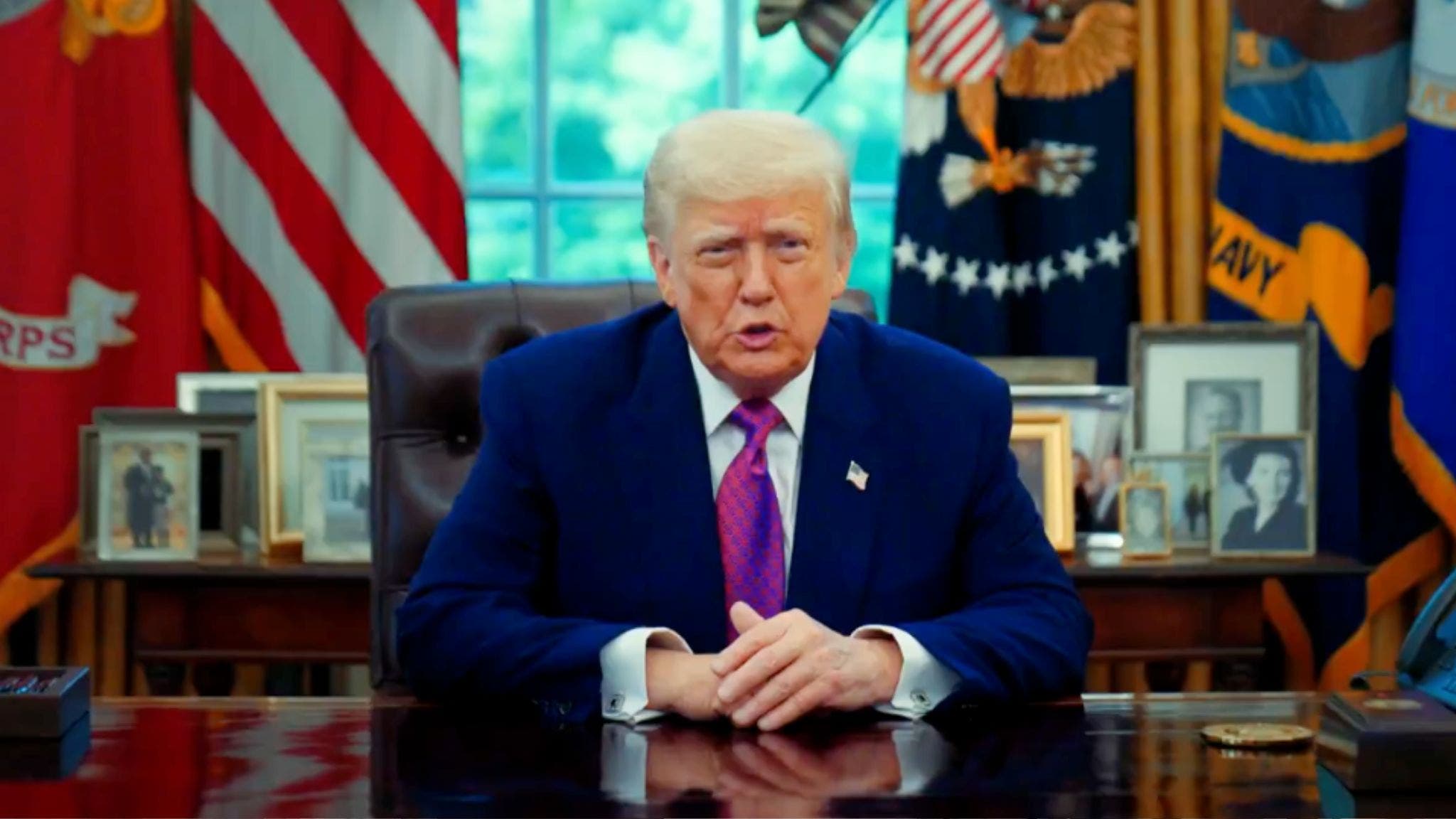
Kai Trump Signs NIL Deal With Accelerator Energy Brand originally appeared on Athlon Sports.
Kai Trump Just Leveled Up Her NIL Game, And She’s Only Getting Started
Six million followers. One rising golf career. And now, a power move into business.
Advertisement
On July 15, future University of Miami golfer Kai Trump signed a NIL deal with Accelerator Active Energy, the same brand tied to Travis Kelce and Livvy Dunne. The announcement wasn’t subtle. It came with a bold video, a presidential-style speech, and a message that Kai isn’t just a face, she’s a force.
This isn’t your average endorsement. Kai is joining as an equity partner. That puts her in rare air among student-athletes.
And she hasn’t even swung a club in college yet.

University of Miami golf commit, Kai Trump.Courtesy of On3
NIL Meets Golf Meets Gen Z Influence
Trump’s deal with Accelerator is a clear signal: golf is stepping into the NIL spotlight. Until now, the sport has been slow to cash in on the explosion of college athlete branding. Kai changes that.
Advertisement
She’s the first golf athlete to land a deal with the California-based energy drink. Her name will be featured in campaigns. Accelerator will become a staple on her social media. With over 6 million followers across TikTok, Instagram, and YouTube, she has the reach, and now, the brand alignment.
“She’s going to be a leading voice in NIL and beyond,” said Andrew Wilkinson, CEO of Accelerator.
He’s not wrong.
A Deal With Power Behind It
Travis Kelce. Livvy Dunne. Paula Badosa. Evan Carter. Now, Kai Trump joins the athlete roster of a company that’s picking winners.
Accelerator isn’t just hyping athletes. They’re building a team of cultural icons. Their formula? No sugar. No taurine. Just clean energy and brain-boosting blends. NSF Certified. Plant-based ingredients. The kind of thing that hits with both health-conscious athletes and everyday fans.
Advertisement
For Trump, it’s about more than energy on the golf course.
“An energy drink like Accelerator helps me stay locked in,” Kai said. “Whether I’m training, studying, or traveling, it fits into everything I do.”
Related: Explaining The NCAA’s One-Time Transfer Portal Window
Why This Deal Matters
This is more than a one-off. It’s a blueprint.
Kai Trump just proved that women’s golf has a seat at the NIL table. She’s not waiting for college trophies or tour wins. She’s building her brand, and her bank account, before her first swing in NCAA play.
The partnership video, filmed at Trump International Golf Club in West Palm Beach, leans into her name but makes it clear: this moment is hers.
And she’s just getting started.
Related: CSC Blocks Collective NIL Deals, Sparks Antitrust Concerns
This story was originally reported by Athlon Sports on Jul 15, 2025, where it first appeared.
NIL
Peter Burns, Chris Doering give SEC, 2025 college football season predictions
SEC Network’s Peter Burns and Chris Doering gave their 2025 SEC and college football predictions ahead of the season. It was during SEC Media Days on location in Atlanta. The two hosts went through five categories featuring coaches, teams and individuals. It was pretty carpeted to the conference, except for one pick. However, there are […]

SEC Network’s Peter Burns and Chris Doering gave their 2025 SEC and college football predictions ahead of the season. It was during SEC Media Days on location in Atlanta.
The two hosts went through five categories featuring coaches, teams and individuals. It was pretty carpeted to the conference, except for one pick.
However, there are some surprises from the pair as well. Let’s dive in, starting with the SEC Coach of the Year.
SEC Coach of the Year
Peter Burns: Brian Kelly, LSU
Chris Doering: Brent Venables, Oklahoma
Burns opted for Kelly to finally put it all together for the Tigers this season. Going into Year 4, a lot of LSU fans are uneasy and want to see at least a College Football Playoff berth.
Venables is a bit under the gun, so he needs to succeed in the SEC this year. But this 2025 Oklahoma team might have the most firepower of previous Venables’ teams.
SEC Offensive Player of the Year
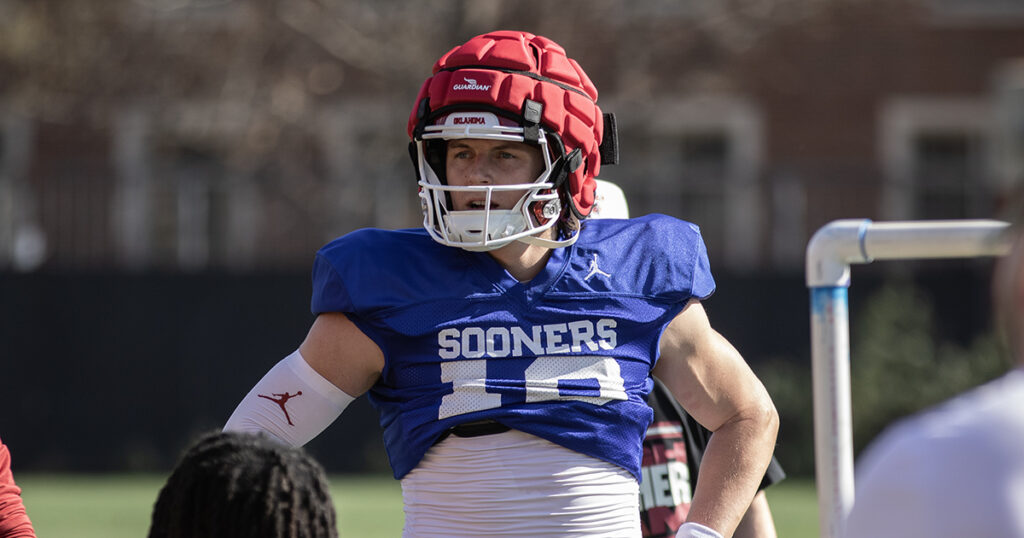
Peter Burns: Arch Manning, QB – Texas
Chris Doering: John Mateer, QB – Oklahoma
Burns went with Manning to break out in his first year as a starter. He’s got the weapons, the talent and the coaching, so Manning has a chance to be the SEC’s best quarterback.
For Doering, he likes Washington State transfer John Mateer. That won’t be the last time you read the dual threat QB’s name on this list.
SEC Champion
Peter Burns: Georgia
Chris Doering: LSU
Georgia will return to the mountaintop of the SEC for the second straight year, per Burns. After beating Texas last year, the Bulldogs will repeat as champs and be one of the top seeds in the CFP.
Doering is high on LSU this year, despite not picking individual awards for the Tigers in the previous categories. It appears this’ll be Kelly’s best year as head coach.
Heisman Trophy Winner
Peter Burns: Cade Klubnik, QB – Clemson
Chris Doering: John Mateer, QB – Oklahoma
Burns picked the only non-SEC player or team on this list by going with Klubnik out of the ACC. The Clemson QB is slated to have the best year of his career and could be the No. 1 overall pick in 2026.
Doering already picked Mateer to win the SEC Offensive Player of the Year, so naturally, he has a chance to win the Heisman. If he improves upon last year’s stat line, it’ll be hard to deny the new Sooners’ quarterback.
National Champion
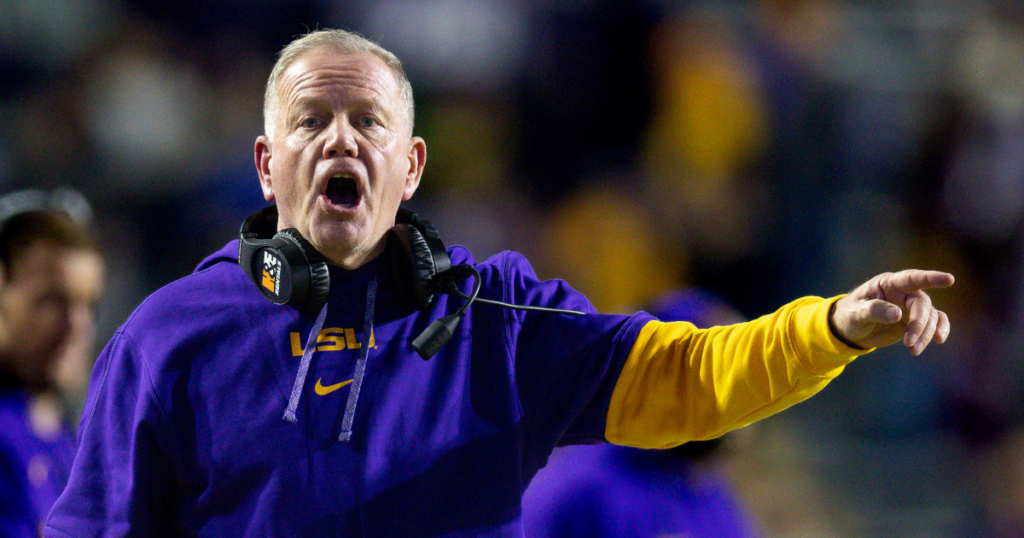
Peter Burns: N/A
Chris Doering: LSU
Here’s where TV gets fun. Burns didn’t pick an SEC team. In fact, he didn’t even pick a team at all for preseason predictions! What are we doing?!
Doering opted for LSU and Brian Kelly gets his first national championship, a long awaited goal. He’s been to the game before, but has fallen short. It seems like LSU is all in for 2025.
NIL
Paul Finebaum hints that new NIL landscape could derail college football powerhouse
Longtime ESPN analyst and SEC pundit Paul Finebaum predicts one of the game’s top powers to falter in this season due to challenges stemming from the Name, Image and Likeness world of college football. Schools have been forced to adapt to a new NIL era in the aftermath of the House settlement. The revenue-share model, […]

Longtime ESPN analyst and SEC pundit Paul Finebaum predicts one of the game’s top powers to falter in this season due to challenges stemming from the Name, Image and Likeness world of college football.
Schools have been forced to adapt to a new NIL era in the aftermath of the House settlement. The revenue-share model, allowing schools to allocate up to $20.5 million to athletes this year, is the new status quo.
Despite the settlement’s proposed intention to reign-in the unsustainable NIL spending, those lofty deals, sometimes undeserved in terms of on-field performance, continues to a sticking point.
In an appearance on ESPN’s “First Take,” Finebaum revealed his questions of Georgia and two-time national champion head coach Kirby Smart after an uncharacteristic 2024 campaign.
After not losing a regular season game for the better part of three seasons, the Bulldogs suffered regular season losses to both Alabama and Ole Miss. Smart and Co. responded with their third SEC championship before falling to Notre Dame, 28-10, in the College Football Playoff quarterfinals.
Georgia enters the 2025 season with questions at quarterback after Carson Beck’s transfer to Miami on a reported NIL package worth $4.5 million.
Gunner Stockton is the favorite after replacing an injured beck in the SEC title game and playoff appearance. And his first season as the full-time starter features matchups against playoff contenders like Alabama, Ole Miss and Texas.
Those matchups will come at home, but Finebaum isn’t high on Stockton, or Georgia as a program in the current NIL landscape.
“This year they have those games at home, so they have a chance,” Finebaum said during SEC Media Days. “But I don’t think Georgia has a quarterback, which is what is going to be their undoing. Gunner Stockton did not show me anything in the just epic loss and loss of not only the game, but loss of composure and maybe loss of traction.”
“So I think Kirby Smart has a lot to answer for when he gets here this week,” Finebaum said. “But, NIL is the reason just to double up on what everybody else has said, there’s just so much going on you, you can’t hold on to your rosters, so you’re going to lose critical backup people or starters that may be the difference between an undefeated season and losing two or three games.”
Georgia’s decision to move on from Beck, stick with Stockton and not sign a transfer quarterback will be a talking point all season.
What Smart and his staff do have, as Stockton progresses, is the nation’s No. 2 roster. Only Texas ranks higher than the Bulldogs in blue-chip ratio this year.
That’s due, in part, to dominant recruiting. While talking heads wonder if Georgia can keep up with the NIL surge, the Bulldogs have yet to finish outside of the top five in recruiting in the last nine years and are coming off the No. 2 class in the 2025 cycle.
The talent will be there for Stockton to be successful, and it’s up to the redshirt junior and the Bulldogs to silence the doubters.
That journey will begin in the season opener against Marshall on Aug. 30 at 3:30 p.m ET (ESPN).
NIL
Georgia’s Smart Says Money Is Making Players Too Comfortable
Georgia’s Smart Says Money Is Making Players Too Comfortable Privacy Manager Link 0
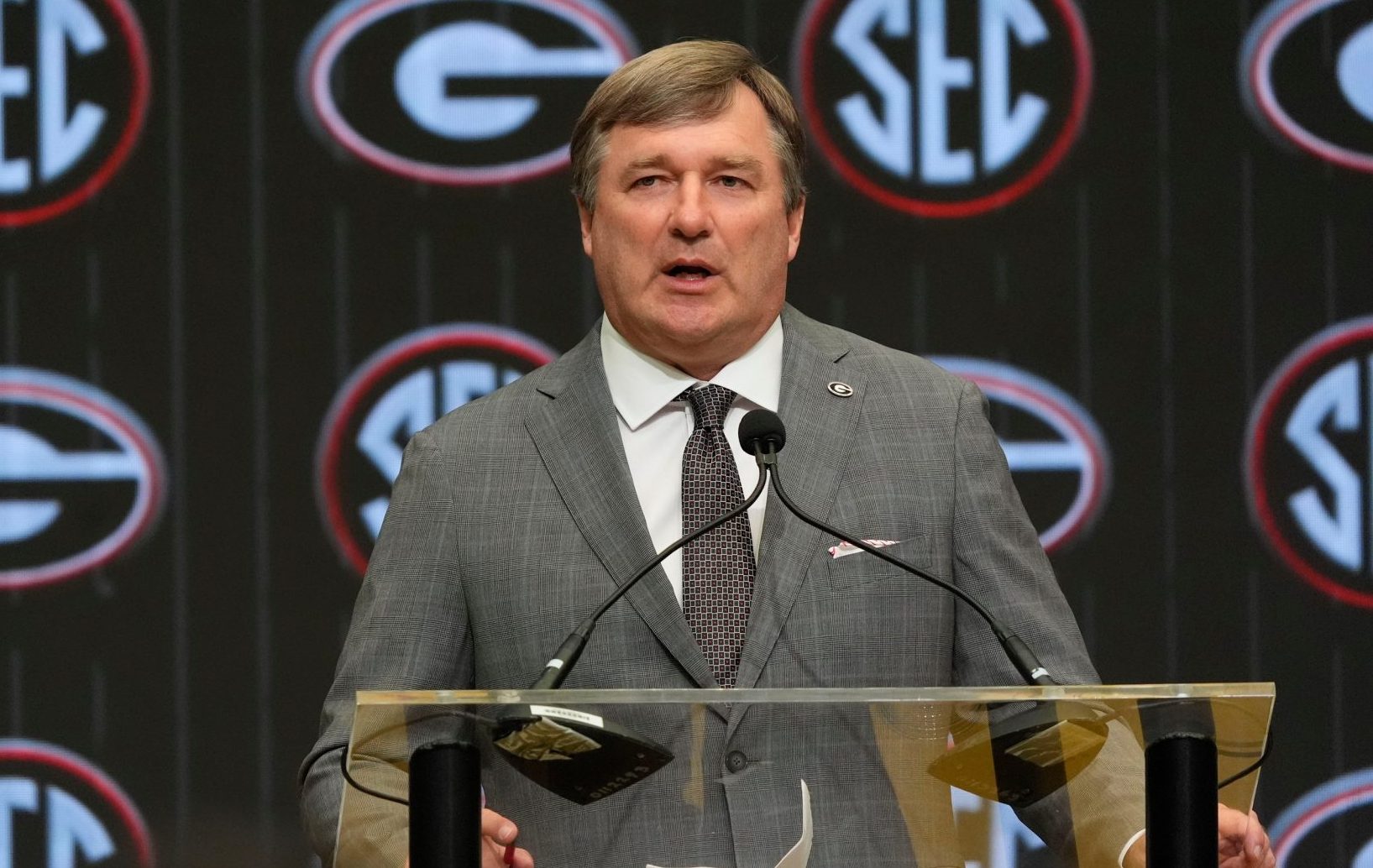
NIL
UMaine not providing direct NIL payments to athletes 'at this point in time'
The University of Maine has opted in to the historic NCAA settlement that allows schools to pay student athletes directly for the first time. But UMaine is not providing those direct payments to players — at least not yet. The settlement requires the NCAA, member conferences and schools to pay back damages to past and current […]



The University of Maine has opted in to the historic NCAA settlement that allows schools to pay student athletes directly for the first time. But UMaine is not providing those direct payments to players — at least not yet.
The settlement requires the NCAA, member conferences and schools to pay back damages to past and current athletes, while also allowing schools to start paying players directly via name, image and likeness deals.
While schools can start using their own funds to pay athletes directly in those NIL deals, they don’t have to do so. And as this new system gets underway for Division I athletics, UMaine is holding off on paying players directly for now while assessing the potential for those payments moving forward.
“At this point in time, we are not providing direct NIL pay,” the UMaine athletic department said Tuesday in response to questions from the Bangor Daily News. “This is something we will assess — with our colleagues within the university and University of Maine System — to see what that might look like in the future.”
The landmark settlement resolves several antitrust lawsuits brought by current and former college athletes against the NCAA. Until late June, UMaine wasn’t even planning to opt in to the settlement, instead intending to opt out for the coming year. But new guidance and additional flexibility around incoming roster limits ultimately helped shift the calculus for UMaine and many other Division I schools around the country that reversed course and ultimately decided to opt in to the agreement.
Schools had a choice whether to join or forgo the settlement, which provides roughly $2.8 billion in damages to past and current college athletes and allows the institutions that opt in to pay players directly in addition to the longstanding use of scholarships and financial aid. Individual schools are capped at providing $20.5 million in direct payments in the coming year.
While college athletes had already been able to profit off their name, image and likeness with endorsements and other commercial deals, that had been limited to third parties. The NCAA settlement opens the door to schools providing NIL money directly to players.
That and other changes ushered in as part of the settlement will make for a new landscape across Division I athletics, even for schools like UMaine that don’t plan to pay players NIL money right away.
“By and large, for any additional expenses — and certainly any in the immediate future — we will be reshaping our current budget and/or relying on private funding to help supplement our public university’s efforts,” the UMaine athletic department said when asked about the potential budgetary impacts in this new era of athlete compensation.
If UMaine were to start providing NIL pay directly to student athletes, it remains unclear how that compensation might be distributed across different sports and programs at the university.
“UMaine is committed to nondiscrimination and will comply with all state and federal laws, including those that pertain to equity in collegiate sports,” the athletic department said when asked about that potential distribution.
The athletic department plans “to explore both public and private sources to support UMaine and our student-athletes” moving forward in this new landscape.
The NCAA settlement applies to schools with a Division I athletic program. UMaine is the state’s only Division I institution.
-

 Technology3 weeks ago
Technology3 weeks agoPet fitness and wellness trends for a healthier and happier dog
-

 College Sports3 weeks ago
College Sports3 weeks agoWAC to Rebrand to UAC, Add Five New Members in 2026
-

 College Sports3 weeks ago
College Sports3 weeks agoA new era of Dickinson hockey begins behind the bench – The Dickinson Press
-

 Motorsports2 weeks ago
Motorsports2 weeks agoWhy Cosmetics are Making Up for Lost Time in Women’s Sports
-

 Health3 weeks ago
Health3 weeks agoFlorida assault survivor shares hope for change with new mental health law
-
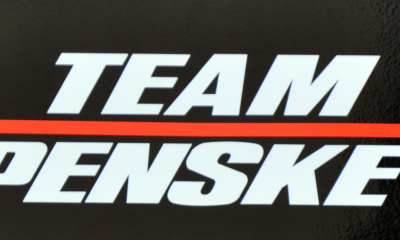
 Motorsports2 weeks ago
Motorsports2 weeks agoTeam Penske names new leadership
-

 Motorsports3 weeks ago
Motorsports3 weeks agoNASCAR This Week – Patriot Publishing LLC
-

 Sports7 days ago
Sports7 days agoNew 'Bosch' spin
-

 Youtube2 weeks ago
Youtube2 weeks agoBREAKING: NBA MVP Shai Gilgeous-Alexander signs the RICHEST annual salary in league history
-

 Sports1 week ago
Sports1 week agoE.l.f Cosmetics Builds Sports Marketing Game Plan Toward Bigger Goals





























